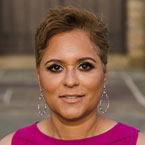By: Nia Heard-Garris MD, MSc, FAAP & Jacqueline Dougé, MD, MPH, FAAP
Horrific events like the killing of George Floyd and the protests and civil unrest that followed graphically illustrate how racism and discrimination harms everyone in our communities.
The American Academy of Pediatrics condemns racism in all forms. And pediatricians are deeply concerned about the effects of racism on children. Even vicarious racism – secondhand racism witnessed through social media, conversations with friends or family, or media images – harms children's health.
Children are listening
As a parent, you must assume children of almost any age are hearing about what is
happening in our nation today. They may overhear adult conversations, see a video on YouTube, or watch news coverage of violent protests. They may feel afraid for their own safety or their family's safety. They might have questions about what the protests mean, why people have been killed by police, and if they are safe.
How to help your children understand
Ideally you can talk with them first, in ways they can understand, before they hear about it from other sources. When talking to your children, keep the following tips in mind:
Check in with your child. Ask what they know, what they've seen, and how they are feeling. Tell them you understand their feelings and reassure them it's normal to feel these emotions. You know your child best and what information they can handle. For younger children, tell them what you are doing to keep your family safe. For pre-teens and older children, ask if they've ever experienced mistreatment or racism, or seen it happening to others.
Watch for changes in your child's behavior. Some children may become more aggressive, while others will become withdrawn or scared. If you are concerned that your child may be struggling with
anxiety, fear or distress, call your pediatrician or mental health provider for additional support.
Limit what your child sees in the media. Do not leave the TV on in the background. With older children and teens, watch with them and talk together about what you're seeing. Listen to their observations and share your own. Use commercial breaks, or pause the video, to have brief discussions. With younger children,
limit TV, smartphone, or tablet use, especially when the news is on. Make sure the media they do see occurs in a common area where you can check in.
Be aware of your own emotions. As an adult, tune into how you are feeling and check that you are ok. If you are not, ask for help to deal with the trauma and emotional impact of these events and images. Make a list of your own coping strategies, and when you need to use them, tap into that list.
Use this teachable moment. For all families, this is an opportunity to discuss the history of racism and discrimination in the US and help your children discover ways to make change.
Resources can help. If you struggle to find the “right" words, try using books or other resources to share with your child. The tips in
this article can also help. Remind your children that no one is perfect, talk about what you are doing to be anti-racist, what you have learned, and how you as a family can step up.
Talk and act
It's ok to acknowledge that people are treated differently based on the color of their skin and where they live and share examples of this happening. But this is also an opportunity to show your children how to make a positive difference. For example, perhaps your family can call your city council person or superintendent to advocate for issues faced by communities of color. Think about how you might confront your own biases and show how you want your children to respond to others who may be different than them.
Remember
These are conversations that many Black American families have had for years. But if this is not something your family has discussed yet, what is happening right now is a teachable moment. If we are to progress in this country, it's going to be because we help our children, adolescents and young adults learn not just that racism exists, but that it is something all of us can work together to dismantle.
Additional Information:
About Dr. Heard-Garris:
 Dr. Nia Heard-Garris, MD, MSc, FAAP is a pediatrician and a physician-investigator at the Ann & Robert H. Lurie Children’s Hospital of Chicago and in the Department of Pediatrics at Northwestern University Feinberg School of Medicine. She believes in using research to better inform clinical practice and policy that supports children, their families, and their communities. Within the Academy, she serves as the Chair and founding member of the AAP Section of Minority Health, Equity, and Inclusion. Dr. Heard-Garris, her husband, and beautiful 7-year old son live in Chicago.
Dr. Nia Heard-Garris, MD, MSc, FAAP is a pediatrician and a physician-investigator at the Ann & Robert H. Lurie Children’s Hospital of Chicago and in the Department of Pediatrics at Northwestern University Feinberg School of Medicine. She believes in using research to better inform clinical practice and policy that supports children, their families, and their communities. Within the Academy, she serves as the Chair and founding member of the AAP Section of Minority Health, Equity, and Inclusion. Dr. Heard-Garris, her husband, and beautiful 7-year old son live in Chicago.
About Dr. Dougé:
 Jacqueline Dougé, MD, MPH, FAAP is a pediatrician, public health advocate, writer and creator of
What is Black, a blog and podcast that helps parents raising Black children and teens navigate race, racism and parenting. She's the co-author of the AAP Policy Statement,
The Impact of Racism on Child and Adolescent Health and member of the AAP Section on Minority Health, Equity & Inclusion. Her interests are health disparities, impact of racism on health, media, school health and the interaction of public health and pediatrics.
Jacqueline Dougé, MD, MPH, FAAP is a pediatrician, public health advocate, writer and creator of
What is Black, a blog and podcast that helps parents raising Black children and teens navigate race, racism and parenting. She's the co-author of the AAP Policy Statement,
The Impact of Racism on Child and Adolescent Health and member of the AAP Section on Minority Health, Equity & Inclusion. Her interests are health disparities, impact of racism on health, media, school health and the interaction of public health and pediatrics.